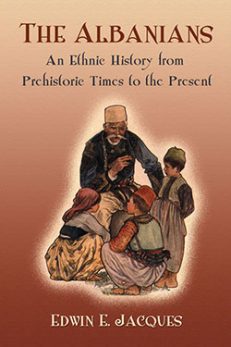The Albanians
An Ethnic History from Prehistoric Times to the Present
$75.00
In stock
About the Book
Historically described as mysterious and xenophobic, Albania and its people are little known to most westerners. But they are near the center of age-old explosive Balkan conflicts. With the employment of Albanian, French, Italian and many other documentary sources, the roots of Albanian civilization, the struggle of the Albanians to maintain their cultural and linguistic integrity, the impact of foreign influence on the country, and its recent move toward democracy are all detailed here.
About the Author(s)
Bibliographic Details
Edwin E. Jacques
Format: softcover (6 x 9 in 2 vols.)
Pages: 748
Bibliographic Info: maps, bibliography, index
Copyright Date: 2009 [1995]
pISBN: 978-0-7864-4238-6
eISBN: 978-0-7864-9347-0
Imprint: McFarland
Table of Contents
Volume 1
Preface ix
Introduction: Who Are the Albanians? xi
Part One: Primeval Albania Colonized by the Greeks and Its Civilization (to 168 B.C.)
1. Archeological Reconstruction of Prehistoric Life in Albania 2
2. Linguistic Ancestry of the Albanian Language and People 29
3. Traditions About Albania in Our Earliest Chronicles 46
4. The Early Historical Kingdoms in Albania (1280–323 B.C.) 78
5. Dissolution of the Albanian Kingdoms and Their Subjugation by Rome (323–168 B.C.) 110
Part Two: Developing Albania Subjugated by the Romans and Its Christianization (168 B.C.–A.D. 1503)
6. The Roman Period (168 B.C.–A.D. 395) 126
7. The Byzantine Period (395–489) 146
8. Occupation of Albania by the Goths (489–535) 149
9. Byzantine Rule Once Again (535–861) 151
10. The Bulgarian Period (861–1014) 156
11. Byzantine Rule Yet Again (1014–1204) 159
12. Norman Rule in Albania (1081–1204) 160
13. Quarreling Feudal Families Vulnerable to the Ottoman Turks 164
14. The Ottoman Turkish Threat 170
15. Gradual Capitulation of Feudal Families to the Ottoman Turks 173
16. Temporary Successes of Skanderberg (1443–1468) 178
17. Final Capitulation of Albania to the Turks (1503) 190
18. Albania’s Peculiar Handicaps in Facing Turkish Occupation 193
Part Three: Christian Albania Occupied by the Turks and Its Islamization (1503–1912)
19. The Turkish Government of Occupied Albania 200
20. Reasons for the Adoption of Islam by Albanian Christians 213
21. Revolutionary and Diplomatic Efforts for Albanian Independence 241
22. Albania’s Nonviolent Revolution: Its Cultural Renaissance 275
23. Declaration of Albanian Independence at Vlora (28 November 1912) 320
24. Grounds for Confidence in Albania’s Eventual Nationhood 325
Volume 2
Part Four: Muslim Albania Governed by Feudalists and Its Nationalization (1912–1939)
25. The Fourteen Successive Ineffective Governments (1912–1925) 334
26. The Fourteen-Year National Government of Ahmet Zogu (1925–1939) 382
Part Five: Nationalist Albania Seized by the Marxists and Its Communization (1939–1985)
27. The Fascist Occupation and the Rise of Marxism (1939–1944) 410
28. The Stalinist Government of Enver Hoxha (1944–1985) 425
Part Six: Communist Albania Attracted by the West and Its Democratization (1985–)
29. The Reform Government of Ramiz Alia (1985–1992) 584
30. The Democratic Government of Sali Berisha (1992– ) 698
Indexed Maps of Albania 703
Bibliography 711
Index 721
Book Reviews & Awards
- “Detailed…its strength lies in an English summary and presentation of obscure documentary material from the original Albanian…a boon for contemporary scholars…an excellent overview of the region”—Choice






